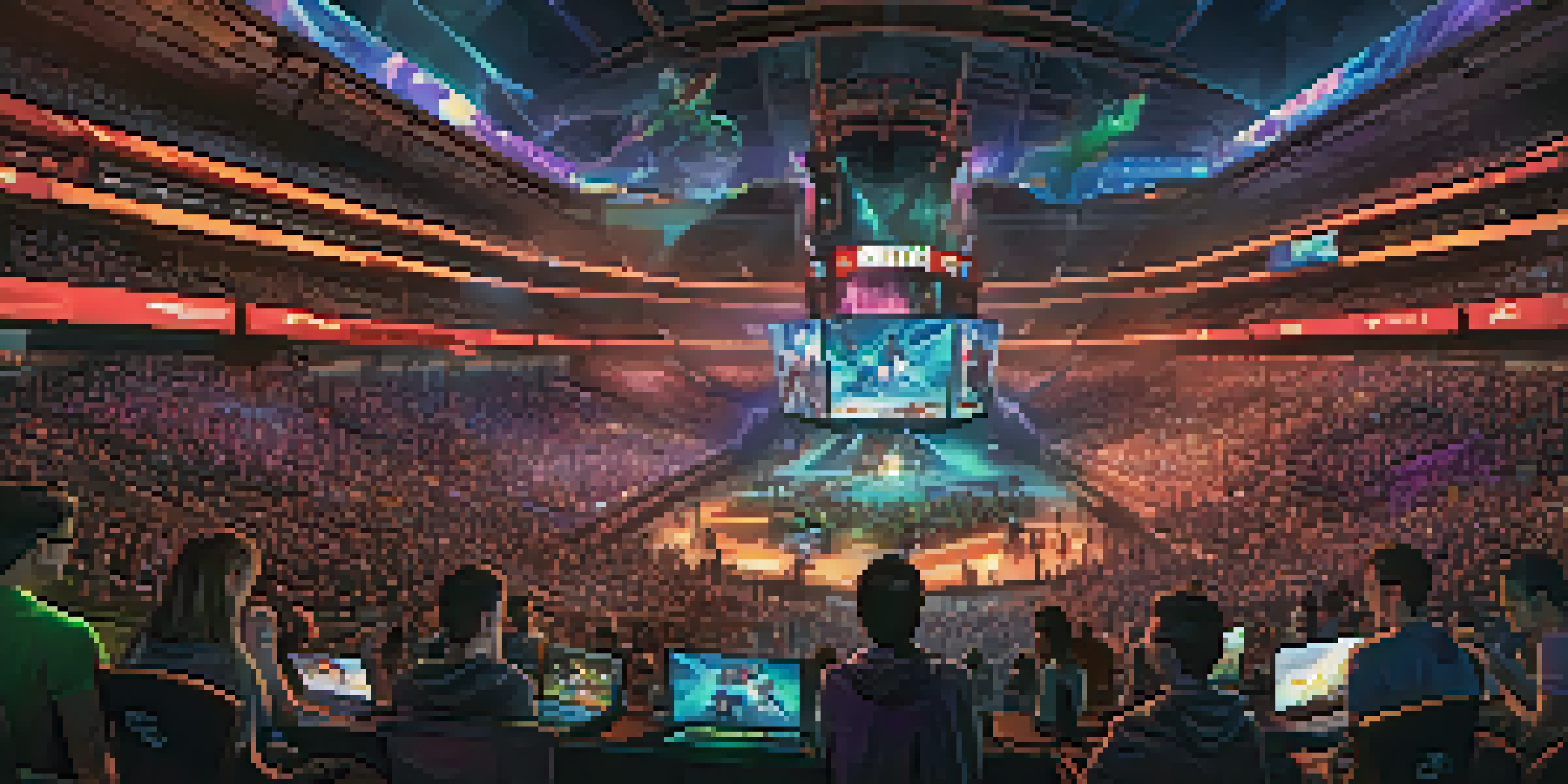The Rise of E-Sports: Technology Behind Competitive Gaming

Understanding E-Sports: A Brief Overview
E-sports, or electronic sports, refers to competitive video gaming where players or teams compete against each other, often in front of large audiences. This phenomenon has transformed gaming from a casual pastime into a global entertainment industry. With its roots in arcade competitions of the '80s, e-sports has grown exponentially, drawing millions of viewers and players alike.
E-sports is the ultimate convergence of gaming and competition, showcasing the talent of players in a way that resonates with audiences worldwide.
Today, titles like League of Legends, Dota 2, and Fortnite dominate the scene, each boasting dedicated professional leagues and tournaments with substantial prize pools. The excitement of watching skilled players battle it out is akin to traditional sports, creating a vibrant community of fans and participants. This evolution has made e-sports a legitimate career path for many aspiring gamers.
As the popularity of e-sports continues to rise, it shapes not only the gaming landscape but also the broader entertainment industry, influencing everything from sponsorship deals to media coverage. The blend of technology and competition has made e-sports a cultural phenomenon that resonates with a diverse audience.
The Technology Powering E-Sports Competitions
At the heart of e-sports is the technology that enables seamless gameplay and interaction. High-performance gaming computers, advanced graphics cards, and ultra-fast internet connections create an optimal environment for both players and viewers. This technological infrastructure ensures that games run smoothly, providing an engaging experience for everyone involved.

Streaming platforms like Twitch and YouTube Gaming have revolutionized how fans consume e-sports content. These platforms allow gamers to broadcast their gameplay live, creating a real-time connection with their audience. Viewers can interact with streamers through chat, fostering a sense of community that traditional sports broadcasts often lack.
E-Sports: A Cultural Phenomenon
E-sports has evolved into a global entertainment industry, drawing millions and legitimizing gaming as a career.
Additionally, innovations such as virtual reality (VR) and augmented reality (AR) are beginning to play a role in e-sports, offering immersive experiences that can elevate gameplay and audience engagement. As technology continues to advance, the potential for new forms of competition and spectator experiences will only expand.
The Role of Streaming Platforms in E-Sports Growth
Streaming platforms have been pivotal in the rise of e-sports, acting as a bridge between gamers and their audiences. Services like Twitch have created a dedicated space for gamers to showcase their skills while allowing fans to engage directly. This interaction fuels a sense of belonging among viewers, making them more invested in the outcomes of competitions.
The community aspect of e-sports is what truly sets it apart; it's about friendship, collaboration, and a shared passion for gaming.
Moreover, these platforms offer various features like chat rooms, subscriptions, and donations that support streamers financially. This model incentivizes gamers to pursue professional streaming as a viable career, further legitimizing e-sports as a mainstream industry. It's not just about playing games; it's about building a brand and community.
The success of these platforms has also attracted the attention of advertisers and sponsors, leading to lucrative partnerships that help sustain and grow the e-sports ecosystem. As more people tune in to watch their favorite players, the potential for monetization continues to expand, driving the industry's growth even further.
E-Sports Tournaments: A New Era of Competition
E-sports tournaments have become grand spectacles, drawing in large crowds and major sponsors. Events like The International for Dota 2 and the League of Legends World Championship showcase the pinnacle of competitive gaming, with millions of dollars in prize money on the line. These tournaments have elevated e-sports to the level of traditional sports, complete with elaborate productions and fanfare.
The thrill of watching teams compete at the highest level is akin to the excitement of the Super Bowl or the World Series. Fans flock to arenas and stadiums to support their favorite teams and players, creating an electrifying atmosphere. The sense of community and shared experience makes these events unforgettable for participants and spectators alike.
Tech Drives E-Sports Growth
Advanced technology and streaming platforms enhance gameplay and viewer engagement, fueling the rise of e-sports.
Additionally, the accessibility of online streaming allows fans who cannot attend in person to join in on the excitement. With millions tuning in from around the world, e-sports tournaments have become a global phenomenon that brings together diverse audiences in a shared passion for gaming.
The Impact of Technology on Game Development
The rise of e-sports has significantly influenced game development, pushing creators to design games that are not only engaging but also competitive. Developers are increasingly focusing on balance, mechanics, and spectator appeal, ensuring that games can thrive in a competitive environment. This shift has led to the creation of titles specifically tailored for e-sports audiences.
Moreover, the use of analytics and data has become essential in refining gameplay and enhancing player performance. Developers analyze player behavior and match statistics to identify trends and areas for improvement, leading to updates and patches that keep games fresh and competitive. This data-driven approach helps maintain a vibrant gaming ecosystem.
As technology advances, we can expect even more innovative features that enhance the gaming experience. Cross-platform play, enhanced matchmaking systems, and improved graphics are just the beginning of what’s possible in the ever-evolving landscape of e-sports.
The Community Aspect of E-Sports Culture
One of the most compelling aspects of e-sports is its strong sense of community. Gamers from various backgrounds come together to share their passion for competitive gaming, often forming friendships that extend beyond the virtual world. This sense of belonging is what makes e-sports more than just a hobby; it’s a lifestyle for many.
Online forums, social media groups, and local tournaments provide spaces for fans to connect, discuss strategies, and celebrate their favorite players. This interaction fosters a culture of collaboration and support, where gamers can learn from one another and grow together. It’s a testament to the power of technology in building relationships.
Community and Inclusivity in E-Sports
E-sports fosters a strong sense of community, encouraging collaboration and support among gamers while promoting inclusivity.
Furthermore, community-driven initiatives like charity streams and grassroots tournaments showcase the positive impact of e-sports beyond just competition. Gamers often unite for a common cause, demonstrating that their love for gaming can lead to meaningful contributions to society.
Future Trends: What’s Next for E-Sports?
As e-sports continues to evolve, several trends are shaping its future. One notable trend is the increasing integration of artificial intelligence (AI) in gaming. AI can enhance matchmaking, analyze player performance, and even create dynamic game environments, making for more engaging and personalized experiences.
Additionally, the rise of mobile gaming is opening new avenues for e-sports. With smartphones becoming more powerful, competitive gaming is no longer limited to traditional consoles and PCs. This accessibility is democratizing e-sports, allowing more players to participate and compete, regardless of their equipment.

Finally, we can expect a continued emphasis on inclusivity and diversity within the e-sports community. As the industry grows, there’s a concerted effort to ensure that it welcomes players of all backgrounds, genders, and skill levels. This commitment to diversity will enrich the gaming experience and help e-sports reach new heights in the years to come.